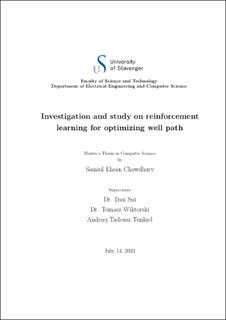| dc.description.abstract | Designing an optimal path has been considered one of the key challenges for drilling engineers. Even for a group of competent engineers, it takes many months to plan a well. A robust optimized path can influence total cost of wellbore, transport efficiency, and drilling speed. A proper optimized path can be called, if it is the shortest path, avoids collision, and has maximum contact with the reservoir.
The aim of this paper is to investigate the efficiency of machine learning algorithm to design an optimal path. In order to draw an optimal path, this thesis will apply QLearning of Reinforcement Learning in python and Path Tracing engine in Unity3D. The agent in both programs will interact with the environment, achieving maximum reward upon reaching goal or penalties with passing through the obstacles which are given. Numerous studies have been conducted on this subject recently. This thesis will show the behaviour of the algorithms to obey the main criterion of the trajectory design as an alternative solution. | |
